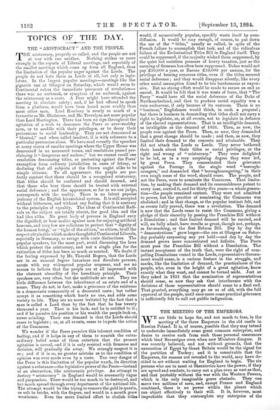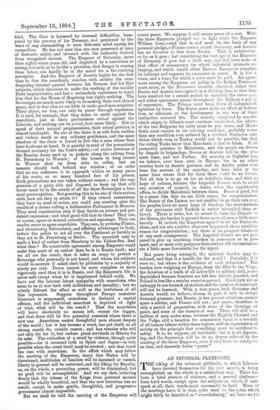THE MEETING OF THE EMPERORS.
WE see little to hope for, and not much to fear, in the meeting of the three Emperors in the old castle in Russian Poland. It is, of course, possible that they may intend to undertake immediately some great common enterprise, and desire to receive each from each those personal assurances which bind Sovereigns even when new Ministers disagree. It was recently believed, and not without grounds, that the annexation of Egypt by Great Britain would be the signal for the partition of Turkey ; and it is conceivable that the Emperors, for reasons not revealed to the world, may have de- cided to act without waiting for England to begin. The six persons who are to meet at Skernievice have the power, if they are agreed and resolute, to carry out a plan even as vast as that, and that probably without the war with the Western Powers, which is the only imaginable grave obstacle. They can move two millions of men, and, except France and England combined, there is no power within the planet which can object effectively to their will. It is, however, most improbable that they contemplate any enterprise of the kind. The Czar is harassed by internal difficulties, ham- pered by the poverty of his Treasury, and perplexed by the want of any commanding or even first-rate mind among his counsellors. He has not near him one man possessed at once of first-rate ability and invested with the authority derived from recognised success. The Emperor of Germany, more than eighty-seven years old, and dispirited by a conviction so strong, it is said, as to be like a prevision, that danger is coming from below, can hardly be in the mood for a far-reaching enterprise. And the Emperor of Austria begins for the first time to fear the anarchists, watches with anxiety the ever- deepening internal quarrel between his German and his Slav subjects, which threatens to make the working of the smaller Diets impracticable, and has a melancholy experience to teach him that for the House of Hapsburg war rights nothing. The Sovereigns are much more likely to be seeking their own idea of peace, and in that idea we see little to make good men sanguine. Their object, we fear, can only be peace through repression. It is said, for example, that they desire to unite against the anarchists, just as their predecessors united against the Liberals, and nothing can be prima' facie more likely. Not to speak of their natural prepossessions, their actual position is almost intolerable. No one of the three is as safe from sudden and violent death as any ordinary gentleman, and the most absolute of the three is forced to live like a man whose final hour is always at hand. It is painful to read of the precautions deemed necessary for the Czar's safety,—of entire divisions of the Russian Army used up in pickets along the railway from St. Petersburg to Warsaw of the houses in long streets in Warsaw shut up Lora attic to cellar, lest an assassin should lurk behind any window ; of an order that no one unknown is to approach within so many paces of his route, or so many hundred feet of his person. Such precautions are not taken without reason ; and the sup- pression of a party able and disposed to keep up that evil terror must be in the minds of all the three Sovereigns a fore- most preoccupation. But granting this to be one of their serious ends, how are they to attain it ? If they intend concessions, they have no need of union, nor could any meeting alter the results of a decree calling a deliberative Parliament in Moscow. They need combination only if they decide on intense and per- sistent repression ; and what good will that do them? They can, of course, agree on mutual extradition and espionage. They can resolve never to spare anarchists. They can, by pressing France, and threatening Switzerland, and offering advantages to Italy, induce the police to act all over the Continent as harshly as they act in St. Petersburg or Berlin. The anarchist may be made a kind of outlaw from Hamburg to the Yellow Sea. And what then? No conceivable agreement among Emperors could make him more of an outlaw than he is in Russia itself ; and we all see the result, that it takes an army to protect a Sovereign who personally is not hated, and whom his subjects would to-morrow if asked elect by plebiscite by a majority of ninety per cent. Power cannot be more complete or more vigorously used than it is in Russia, and the Emperor's life is never safe except when he is imprisoned behind walls. We have not the faintest latent sympathy with anarchists, who seem to us at war both with civilisation and morality ; but we utterly distrust the effect 88 well as the lawfulness of all this repression. Suppose throughout Europe anarchist literature is suppressed, anarchism is declared a capital offence, and the individual anarchist is deprived of right of trial, what will be the result ? That the anarchists will have absolutely no means left, except the dagger, and that there will be five potential assassins where there is now one. Anarchism makes thoughtful men almost despair of the world ; but it has become a creed, has put itself, as all strong creeds do, outside reason ; and has votaries who will not only die for it, but endure penal servitude or Siberia for its sake. The extinction of a creed by violence, though quite possible—for it occurred both in Spain and Japan—is only possible when the creed itself must be avowed and that is not the case with anarchism. In the effort which may follow the meeting of the Emperors, many free States will be threatened, multitudes of families will be harassed or ruined, liberty in general will be restricted, and the liking for Royalty, as, on the whole, a protecting power, will be diminished, but no good will be accomplished. And we say that, believing firmly that the release of the Binge from personal menace would be wholly beneficial, and that the new terrorism has no result, except to make gentle, thoughtful, and progressive government almost impossible. But we shall be told the meeting of the Emperors will secure peace. We suppose it will secure peace of a sort. With the three Emperors pledged not to fight while the Emperor William lives,—and that is, and must be, the limit of any personal pledge,—France cannot attack Germany, and Austria has no invasion to fear from Russia. That is satisfactory, so far as it goes ; but considering the vast age of the Emperor of Germany, it goes but a little way, and will have none of that effect of reassurance for which industrial interests are longing, and which would allow Eastern Europe to complete its railways and organise its commerce in peace. It is but a truce, and a truce for which a price must be paid. An agree- ment among the Emperors on policy in the Balkan Peninsula must mean, as the Economist recently observed, either that Russia and Austria have agreed on a dividing line, or that they have resolved for a certain period to maintain the status quo, and either agreement means throughout the Balkans a policy of repression. The Princes must keep down all independent agitation by force. The States must make no effort at federa- tion, or alliances, or the development in any way of their instinctive national life. The anarchy tempered by murder which reigns in Albania must continue unchecked, the efforts of the two Bulgarias for unity must be put down, and Mace- donia must remain in its existing condition, probably worse than any condition ever endured by a civilised State,—a con- dition which even in Turkey would not be possible, but that the ruling Turks know that Macedonia is lost to Islam. If all prosperity perishes in Macedonia, and the people are driven by despair to brigandage, Greece or Austria will be the ulti- mate loser, and not Turkey. No anarchy so frightful has, we believe, ever been seen in Europe, for in no other country have an Asiatic garrison and an Asiatic police ever been the sources of the anarchy, and have been at the same time aware that for them there could be no future. Yet all this is to go on for an indefinite time, and with no hope of redress, because the Imperial Powers wish to avoid any occasion of quarrel, or desire, when the opportunity offers, to divide Macedonia between them. Peace is good, but in a peace like this we see little reason for congratulation. The States of the Balkan are not enabled to go their own way, the peoples have no more hope of freedom, the wretchedness of the provinces still Turkish is rather intensified than re- lieved. There is order, but to secure it, from the Danube to the Morea, the burden is pressed down upon all men a little more heavily. If, indeed, the Emperors agreed to let the Peninsula alone, and not stir a soldier whatever happened, there would be reason for congratulation ; but there is no prospect whatever of any such arrangement. The Imperial Courts are not pre-. pared to give up anything, whether in possession or in pro- spect, and at most only postpone their contest till circumstances are a little more favourable for the signal.
But peace being arranged, the military burden may be reduced, and that is a benefit for the world ? Certainly, if it were so ; but where is the evidence of such reduction The burden now weighing on Europe, from the Elbe to the Volga, the devotion of a tenth of all active life to military drill, is not diminished because frontiers are left less strictly guarded, and Poland is less like a cavalry exercise-ground. Conscripts are as unhappy in one barrack as another, and the number of conscripts will not be lessened. With a true peace, both Germany and. Austria would, we believe, disarm in part, if only to reduce financial pressure ; but Russia, in her present situation, cannot spare a soldier, and France will not; and peace, therefore, is only a period of preparation, with none of the blessings of peace, and none of the chances of war. There will still be a million of men under arms between the English Channel and the Volga, still a taxation for armaments equal to a seventh of all human labour within those regions, still an organisation of society on the principle that everything must be sacrificed to safety. It is, we suppose, all inevitable ; but it is all depress. ing, and the depression will be in no degree relieved by the meeting of the three Emperors, even if they have no enterprise on foot, and sincerely desire "peace."



































 Previous page
Previous page